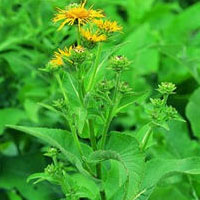Elecampane
 © Martin Wall
© Martin WallParts Used & Where Grown
Elecampane is indigenous to Europe and Asia and is now grown in the United States. The dried roots and rhizomes (branching part of the root) are collected in fall or early winter and used in herbal preparations.
- Reliable and relatively consistent scientific data showing a substantial health benefit.
- Contradictory, insufficient, or preliminary studies suggesting a health benefit or minimal health benefit.
- For an herb, supported by traditional use but minimal or no scientific evidence. For a supplement, little scientific support.
Our proprietary “Star-Rating” system was developed to help you easily understand the amount of scientific support behind each supplement in relation to a specific health condition. While there is no way to predict whether a vitamin, mineral, or herb will successfully treat or prevent associated health conditions, our unique ratings tell you how well these supplements are understood by the medical community, and whether studies have found them to be effective for other people.
For over a decade, our team has combed through thousands of research articles published in reputable journals. To help you make educated decisions, and to better understand controversial or confusing supplements, our medical experts have digested the science into these three easy-to-follow ratings. We hope this provides you with a helpful resource to make informed decisions towards your health and well-being.
This supplement has been used in connection with the following health conditions:
| Used for | Amount | Why |
|---|---|---|
Asthma | Refer to label instructions | Elecampane has been used traditionally to treat coughs associated with asthma. |
Bronchitis | Refer to label instructions | Elecampane is a soothing herb that has been used to treat coughs associated with bronchitis, asthma, and whooping cough. |
Chronic Obstructive Pulmonary Disease | Refer to label instructions | Elecampane is used traditionally to promote mucus discharge. |
Cough | Refer to label instructions | Elecampane has a long history of use for relieving coughs. |
Indigestion, Heartburn, and Low Stomach Acidity | Refer to label instructions | Elecampane has been used by herbalists to treat people with indigestion. |
Traditional Use (May Not Be Supported by Scientific Studies)
Traditionally, herbalists have used elecampane to treat coughs, particularly those associated with bronchitis, asthma, and whooping cough.1 The herb has also been used historically to treat poor digestion and general complaints of the intestinal tract.
Copyright © 2024 TraceGains, Inc. All rights reserved.
Learn more about TraceGains, the company.
The information presented by TraceGains is for informational purposes only. It is based on scientific studies (human, animal, or in vitro), clinical experience, or traditional usage as cited in each article. The results reported may not necessarily occur in all individuals. Self-treatment is not recommended for life-threatening conditions that require medical treatment under a doctor's care. For many of the conditions discussed, treatment with prescription or over the counter medication is also available. Consult your doctor, practitioner, and/or pharmacist for any health problem and before using any supplements or before making any changes in prescribed medications. Information expires December 2024.
